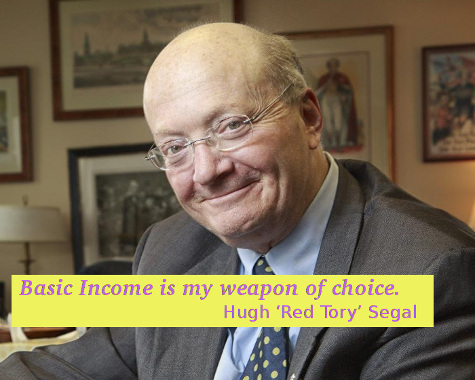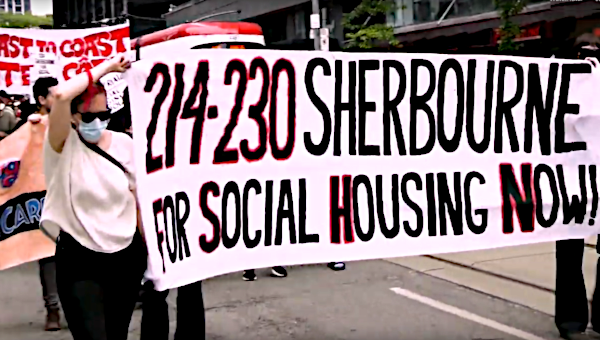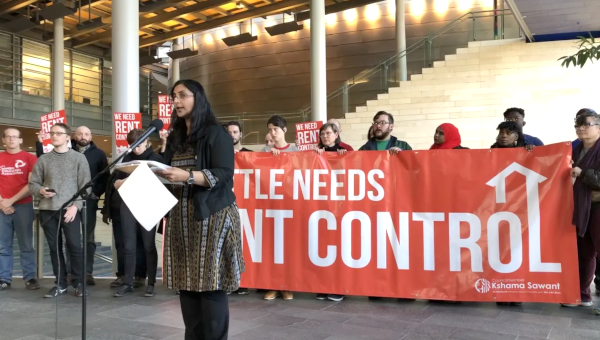Since 2010, the UK has endured a political regime that can be considered a cutting edge of the austerity agenda. Through the film, I, Daniel Blake, people around the world have become familiar with the institutionalized cruelty of the Country’s warped system of providing social benefits to those in need.
 To those who endure sub-poverty misery, the humiliating intrusion of the Work Capability Assessment (WCA) and the ever present threat of the sanctions regime, the conclusion that anything must be better than the present set up is an easy one to arrive at. Disabled people who deal with a state bureaucracy that labels them scroungers and seeks at every turn to abandon them, can be forgiven for concluding that no alternative to the status quo could possibly be worse than that which they face today. The sheer brutality of the regime operated by the Department for Work and Pensions (DWP) can only make the notion of a secure and adequate system of universal income, freed of bureaucratic intrusion and moral policing, extremely alluring. This does much to explain the high levels of receptiveness to the notion of a Universal Basic Income (UBI).
To those who endure sub-poverty misery, the humiliating intrusion of the Work Capability Assessment (WCA) and the ever present threat of the sanctions regime, the conclusion that anything must be better than the present set up is an easy one to arrive at. Disabled people who deal with a state bureaucracy that labels them scroungers and seeks at every turn to abandon them, can be forgiven for concluding that no alternative to the status quo could possibly be worse than that which they face today. The sheer brutality of the regime operated by the Department for Work and Pensions (DWP) can only make the notion of a secure and adequate system of universal income, freed of bureaucratic intrusion and moral policing, extremely alluring. This does much to explain the high levels of receptiveness to the notion of a Universal Basic Income (UBI).
In the UK, Basic Income (BI) is being considered in the context of a political break with the austerity consensus and the posing of an alternative to the agenda that flows from it. BI pilot projects have been called for in Fife and Glasgow and the Labour Party has established a working group to prepare a proposal on the concept, with a view to its being adopted as policy. Shadow Chancellor of the Exchequer, John McDonnell, is very much behind this development. The emergence of a left leadership in the Labour Party and all the gains that it has made is looked to internationally with huge respect and admiration and there is a great deal of moral authority attached to the social policy proposals that it advances. For that very reason, a critical look at the implications of the basic income approach to reshaping systems of social provision is of particular importance. Very frankly, I must argue that it would be a profound mistake for the Labour Party to take that direction and, as an organizer with the Ontario Coalition Against Poverty (OCAP), dealing with an attempt to develop a decidedly neoliberal local brand of BI, I’m going to set out my case for this position.
Basic Income Left and Right
Before talking about the specifics of the emerging experiment with BI in Ontario, let me offer some observations on the general notion. Notwithstanding the fact that BI advocates will frequently present the idea as something that transcends political divisions between left and right, there is a wide acknowledgement it can be proposed in regressive or progressive forms. A version that furthered neoliberal austerity would hinge on the inadequacy of the payment. Some right wingers accept universal entitlement, while some liberal or social democratic thinkers accept restricting it to those on low incomes but the neoliberal brand is always focused on preserving and enhancing economic coercion. Simply put, the payment must not impede the flow of workers into low wage precarious jobs and, indeed, it should function as a de facto wage top up for low paying employers. With wages partly paid out of the general tax revenues, pressure to increase minimum wages would be greatly reduced. Furthermore, the regressive wing of BI advocacy is most insistent that the envisaged payment would replace, rather than augment, other forms of social provision. In this regard, the notorious U.S. political scientist, Charles Murray, sets out a particularly chilling vision and this has been echoed by the Canadian Fraser Institute.
The more hard-line left wing approaches to BI absolutely insist on the universality aspect but all progressive proposals are clear that the payment must be adequate. It must, in and of itself, ensure that basic needs and social participation are within the means of those receiving it. Indeed, given the frequent connection that is made to providing for those who are technologically displaced from their jobs, adequacy at this level is the essential consideration. An actual ability to withdraw painlessly from participation in the capitalist job market is envisioned.
The problem with such ideas is that they take no account of how essential to capitalism a level of economic coercion is and give no thought to the societal balance of forces or the practical prospects of obtaining their goal of a UBI. After several decades of neoliberal austerity, with trade unions greatly weakened and social resistance hardly at peak levels, the prospects for major social reforms are not that good. However, a truly adequate, universal payment that freed millions of workers from the ‘tyranny of the labour market’ would be more than a reform. It would really be a question of the State handing over an unlimited strike fund and, as Pam Frache argues, “Simply put: no capitalist state will provide workers with the resources to go on indefinite strike.”
In an interesting blog piece, Paul Cockshott, in addition to looking at the potential costs of a UBI system in the UK, points out that the embrace of the idea reflects defeat and disorientation on the left. The hope of a social policy solution to the problems created by neoliberalism and the attacks associated with it is profoundly dangerous because that very ‘solution’ can so readily assume a form that furthers the very agenda that left BI advocates hope to escape. The institutions of global capitalism are taking an interest in Basic Income and the Davos crowd are even considering it. In Finland, a government that is moving in decidedly neoliberal directions suddenly assumes interest in BI and puts in place a test run that should alarm us. But let’s now turn to the model that is emerging here in Ontario and the warning it offers us on just the kind of directions BI can be taken in.
Ontario’s BI Test Run
Like other so called BI pilot projects, the one in Ontario is an imposter. I say this because it isn’t actually testing Basic Income. It’s really testing poor people. BI is a social policy that would be implemented across an entire political jurisdiction and that would have particular impacts on the society and its population. No such test is being undertaken in Ontario. The Government is simply going to provide enough income to a sampling of 4,000 poor people to make them a bit less poor and the predictable result will be that most of them will be a bit better off. So, the first thing we should note is that all of the focus on studying ‘outcomes’ is a cynical diversion that tells us nothing about the implications of BI as a neoliberal policy tool.
People who may not be very familiar with the situation in Ontario, need to understand the context in which this pilot emerges. Under the federal system that exists in Canada, the governments of its provinces and territories have the greatest amount of decision making power when it comes to social benefit systems. In Ontario, we have a Liberal Government that has held power since 2003. Unlike the UK, where the Liberals went into a state of faded glory between the wars, their Canadian counterparts have remained front line contenders for political power. They function as a slightly nicer alternative to the Tories but can be trusted to manage things in a way the rich and powerful will find entirely to their liking. You might say they are what Tony Blair intended the Labour Party to be. Over the last fourteen years, the Ontario Liberals have allowed people on social assistance to get even poorer than they were when the Tories held power but they have perfected the art of always appearing like they are about to address the problem. They have held round after round of ‘poverty reduction’ consultations even as the scale and depths of poverty increased. The Basic Income pilot is, for them, a political windfall that enables them to go on promising jam tomorrow while providing nothing today. Nearly a million people on social assistance, many of them disabled, will have their incomes kept well below the poverty line while a lengthy study of 4,000 people on the BI pilot unfolds.
While the pilot is largely motivated by the Liberal Government’s desire to keep people on social assistance in poverty, while shoring up their progressive credentials, it is also an experiment in designing a neoliberal model of Basic Income. The little brochure that announces it is rather thin on details but a memo sent out within the Canadian Union of Public Employees (CUPE), Ontario Division and other information OCAP is party to on a confidential basis, gives us a fair sense of what is being cooked up.
Some 4,000 people, in three parts of Ontario, will be provided with BI payments over the next three years. A separate pilot will run in a selected Indigenous community. Their income will be set at around 75% of the Low Income Measure, with an extra payment for disabled people. 70% of those who are tested will be low waged workers and earned income will be deducted at a rate of 50%. As in Finland, while the pilot is means tested, the income will be provided with far fewer conditions attached to it than under present benefit systems. In my view, those in the neoliberal driving seat are happy to ease up on some of the bureaucratic intrusion precisely because they have been sufficiently successful in creating a scramble for low wage precarious work and simply don’t need it to the same degree. What they are more concerned to do is to extend income support to those on low wages in order to, in effect, provide employers with a subsidy, paid for out of the general tax revenues. The amounts provided under the pilot are clearly inadequate enough that no one would be free of the ‘tyranny of the labour market’ and the supply of low wage workers would be preserved. Indeed, a more widely applied BI system might well pay an even lower amount.
The above cited CUPE Ontario memo gives an indication of a very striking feature of the pilot. While people will face fewer conditions, many will also lose supports and services they currently rely on. People presently on social assistance who go onto the pilot will no longer have caseworkers and will be expected to ‘self navigate’ when it comes to accessing sources of assistance they would previously have obtained with the help of those workers. Moreover, a whole range of supplementary benefits will be lost, such as the Special Diet that provides additional income on the recommendation of medical providers. Medical transportation assistance and mobility devices will also become the responsibility of those who shift to the pilot. Disabled people, especially, might find, despite the additional BI income, that they are actually far worse off than if they had stayed on the Ontario Disability Support Program (ODSP).
The point that emerges here is that even as they roll out their showpiece test run that provides income to just a few thousand people and enables them to be far more generous than they would be if they were setting up a widely available programme, they are cutting back on other entitlements. I think it’s clear that the Ontario Liberals are establishing a model for a low paying, means tested income support system that is primarily concerned with subsidising low paying employers and that would be paid for by cutbacks in other areas of social provision.
Left Welcome Mat for Neoliberal BI
Predictably, the Basic Income Canada Network sounds no alarm on the nature of the Ontario pilot and, indeed, will take an entirely supportive approach. The pattern has already been set among many progressive BI advocates is to present neoliberal models as ‘good first steps.’ In the UK, the advisor to the Labour Party BI working group is Guy Standing from the Basic Income Earth Network. He had contact with the Ontario Government’s BI advisor, helped the Finnish Government design its pilot and has presented to none other than the World Economic Forum at Davos.
As a regressive form of Basic Income, serving and facilitating the neoliberal agenda, is prepared, the deluded notion emerges that a progressive option is there for the taking. It is never really explained how this can happen but is simply taken on faith and I use that word very deliberately. Once it has been accepted that decades of neoliberalism and, indeed, the economic coercion of the capitalist job market can be neutralized with what Miles Krauter refers to as “emancipatory policy visions,” then the realities of a class struggle that has not been going our way for some time seem very unappealing. Like Krauter, the Citizens’ Income Trust in the UK feels that a failure to believe that transformative BI can happen is to lack vision and to fail to offer any viable alternative. However, while the Fountain of Youth does sound a good deal better than dealing with getting old, it suffers from the problem of not existing.
The folly of believing that there is a social policy end run around neoliberal attack can’t be overstated. John McDonnell has suggested that a Labour Government could implement reforms that would outdo those put in place by the post war Attlee Government and “transform capitalism.” As Theresa May’s wretched regime stumbles from crisis to humiliation, people all across the world are asking what can be achieved by a Corbyn led Labour Party. However, it seems to me that a policy that commodifies social provision, accepts low wages while topping them up out of tax revenues and that has the support of such reactionary forces globally, is far short of The Spirit of 45.
We’ve been retreating, rather than achieving reforms, for some decades but, if we are to consider the kind of measures that could be advanced and that working class people could mobilize to win, we can do better than become shoppers in the neoliberal market place. We can demand free, universal and accessible public services and fight for maximum worker and community control over them. We can demand systems of income support that are based on full entitlement, adequate income and that are purged of intrusive regulations and moral policing. We can fight for living wages, instead of offering subsidies to those who pay poverty wages. The neoliberal attack is taking up Basic Income as a weapon. We need to fight it instead of laying down a welcome mat. •





